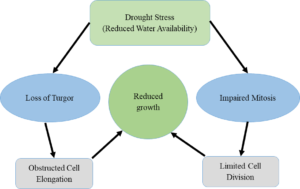September 21 – College of Agriculture and Human Science’s Scientists Ram Ray, Ph.D., Peter Ampim, Ph.D., and Ming Gao, Ph.D., reviewed studies conducted to investigate the effect of drought on crop production and potential measures of mitigation. They provided a critical and comprehensive review of recent studies on the impact of drought on crop physiology, morphology, yields, and global food security, while also commenting on available genetic and agronomic tools available to address drought stress and protect crops under drought conditions. This book chapter contributes to improvements in adaptation strategies suitable for crop production under drought conditions for sustainable agricultural management practices. The chapter titled “Crop Protection Under Drought Stress” is published by Springer Nature in the book “Crop Protection Under Changing Climate”.
Abstract
Climate extremes such as drought have significant impacts on agriculture, natural resources, and the environment. Climate variables such as temperature and precipitation, which have critical roles during a drought, directly impact crop production because they control crop growth, crop health, crop yield, and cropping system yields over time. Moreover, overall drought impact on crop yields is the combined effect of reduced or limited precipitation combined with increased temperature for a prolonged period, which lead to decreased soil moisture and require adapted agricultural management practice. This chapter provides a critical and comprehensive review of recent studies about the impact of drought on crop physiology, morphology, yields, and global food security, while also commenting on available genetic and agronomic tools to address drought stress and protect crops under drought conditions. Furthermore, this chapter focuses on adaptation strategies to mitigate drought and crop management using sustainable and climate-smart agriculture. Best management practices that contribute to the effects of climate change-related to drought adaptation and mitigation include appropriate agronomic and genetic tools for crop protection under drought conditions.
This review aims to contribute to the improvement of adaptation strategies suitable for crop production under drought conditions for sustainable agricultural management practices. It focuses on breeding new drought-tolerant varieties of crop species, developing new approaches to secure stable yields, and selecting early-maturing crop varieties and best irrigation practices. In addition, reduced tillage practices are investigated, since many sustainable agricultural management practices have not been widely adopted due to lack of access to resources, knowledge, and practical experiences.
To read the entire article on Dr. Ray et al.’s research, please visit:
https://link.springer.com/chapter/10.1007/978-3-030-46111-9_6
Ram Ray, Ph.D.
Associate Professor
rayray@pvamu.edu
(936) 261-5094


